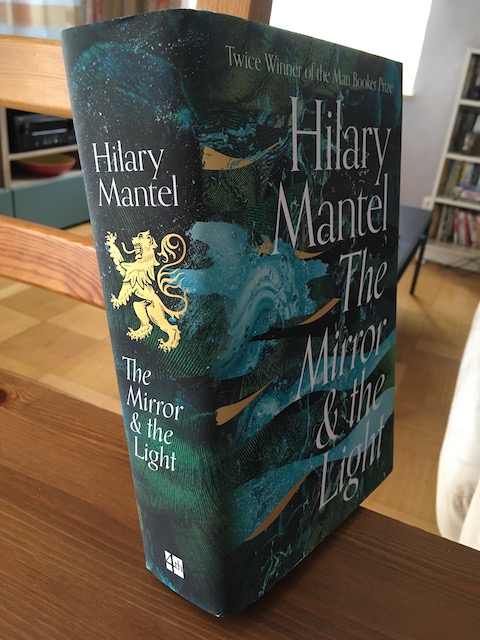Hilary Mantel’s Booker Prize nomination prompts me to finally write some words on The Mirror & the Light – inadequate as they may be. Whilst not exactly putting it off, I just felt, like I said, inadequate – unable to find a way in and unable to cohere my many thoughts. At the time of publication in March, I linked to some various degrees of flattering reviews and there are many more to easily be found around about, so I will only add mention here, and for my own devices, Daniel Mendelsohn’s review in The New Yorker. Firstly, because I always enjoy Mendelsohn’s writing, and secondly, because it errs from the absolutely positive resonance to be found elsewhere – “…bloated and only occasionally captivating…” is less than charitable! – but it is thought provoking anyway, placing as it does this end to the Cromwell saga in the context of the two preceding novels and Mantel’s other work. Also, it does offer a good starting point for me; suggesting some interesting aspects – and doing so sometimes in respect to that which I perceive to be absent.

The New Yorker review is from way back at the beginning of March, and there is no need to get into why that seems now like almost another time – not exactly medieval, but still…! Perhaps, because Mendelsohn’s reading and writing came before the Corona pandemic fully insinuated itself upon us (and what we read, and what we read into that which we read), he doesn’t seem affected by, or least ways lend his criticism to, the pervading atmosphere of death and impending death that at times almost overwhelmed me; be it to come at the gallows, in child-bed – or, and especially, through plague and disease. When the King’s summer tour route has to be meticulously researched and planned to avoid outbreaks of plague [p.680 Fourth Estate ed.], I could do nothing but think of the here and now and thwarted summer holidays. Trivial comparison I know.
Death also finds its extension in the ghosts of the past; omnipresent in the novel and as Cromwell’s constant company – for him, the past is never past (to use Mendelsohn’s expression), nor the dead ever put to rest. Mendelsohn, interestingly, comments more generally in regard to the supernatural in Mantel’s larger body of work – alerting me to an unfortunate gap in my reading, that will be rectified.
Also not mentioned in the review, is the role of rumour and here-say in fuelling discontent amongst the people; the speed at which news and fake-news spreads into far counties (and beyond, to France and the Empire) is startling given the primitive trains of communication, and is eerily reminiscent of the power of social media in this day and age of conspiracies, disinformation and gossip galore. For instance, during the so-called Lincolnshire Rising that anticipated the Pilgrimage of Grace, the folk firmly believe Henry to be dead, a puppet laying in his bed with crown upon its head, and that (the surely to be damned) Th. Cromwell rules in spe, and connives without restraint to demolish the churches, de-frock their clergy, increase taxes and impose draconian levies [p.297].
continue reading